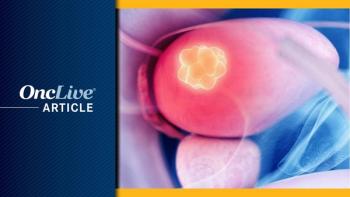
Dr Galsky on the FDA Approval of Nivolumab Plus Chemotherapy in Urothelial Carcinoma

Matthew Galsky, MD, discusses the significance of the FDA approval of frontline nivolumab plus chemotherapy patients with metastatic urothelial carcinoma.
Matthew Galsky, MD, professor of medicine, Hematology and Medical Oncology, director, Genitourinary Medical Oncology, codirector, Center of Excellence for Bladder Cancer, associate director, Translational Research, The Tisch Cancer Institute of Mount Sinai, discusses the significance of the
On March 7, 2024, the FDA granted approval to nivolumab in combination with cisplatin and gemcitabine for the first-line treatment of adult patients with unresectable or metastatic urothelial cancer. This regulatory decision was supported by data from the phase 3 CheckMate 901 trial (NCT03036098), in which the nivolumab combination elicited a median overall survival of 21.7 months (95% CI, 18.6-26.4) vs 18.9 months (95% CI, 14.7-22.4) with chemotherapy alone (HR, 0.78; 95% CI, 0.63-0.96; P = .0171).
Furthermore, the median progression-free survival was 7.9 months (95% CI, 7.6-9.5) with the combination vs 7.6 months (95% CI, 6.0-7.8) with chemotherapy alone (HR, 0.72; 95% CI, 0.59-0.88; 2-sided P = .0012). Additionally, treatment with the nivolumab combination led to an overall response rate (ORR) of 57.6% (95% CI, 51.8%-63.2%), including a 22% complete response rate and a 36% partial response rate. Conversely, the ORR in the chemotherapy alone arm was 43.1% (95% CI, 37.5%-48.9%). Moreover, the median duration of response was 9.5 months (95% CI, 7.6-15.1) with nivolumab compared with 7.3 months (95% CI, 5.7-8.9) with chemotherapy alone.
Ever since the initial development of multi-agent cisplatin-based combination chemotherapy regimens decades ago, cisplatin-based combination chemotherapy has been the longstanding standard of care (SOC) for patients with metastatic urothelial cancer, Galsky says. Although several phase 3 trials have attempted to improve upon this SOC with the addition of different classes of drugs to this chemotherapy backbone, none had met the primary end points of their trials, Galsky explains. However, the CheckMate 901 trial is the first phase 3 trial to elicit positive results with the addition of immunotherapy to cisplatin-based chemotherapy for patients with this disease, Galsky concludes.



































